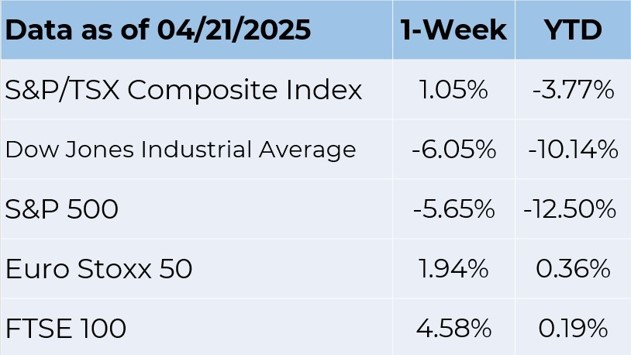Weekly Market Commentary April 25 2025
Canada on Edge
Canada central bank chief Tiff Macklem blames U.S. President Donald Trump for “violently” damaging the Canadian economy. According to Macklem, Trump's policies have created a seismic shift and triggered significant uncertainties. The remark comes on the administration down south, imposing significant tariffs on key Canadian industries.
Macklem insists that Trump's actions represent a rare disruption that could lead Canada into a year-long recession, potentially resulting in increased inflation, higher unemployment rates, and supply chain issues to the extent of triggering bankruptcies.
The bleak economic outlook comes just hours before the first two federal leaders' debates in the Canadian election. The campaigns have centered on Trump's economic onslaught against what used to be America's closest ally and on determining who is most capable of negotiating with his administration the day after Canadians cast their votes.
Over the last 25 years, Canada's real estate market has successfully navigated through every crisis it has faced. However, it may have finally encountered a formidable challenge in the unpredictable policies of U.S. President Donald Trump.
Recently, home sales have significantly declined, leading to a drop in prices, while the inventory of unsold homes continues to grow. Home sales, last month, fell 9.3% to its lowest level since February 2009, when the Great Recession was at its worst. Just 5,011 units were sold in Toronto, the fewest March sales since 1995.
With consumer confidence hitting record lows and the trade conflict poised to raise inflation rates and push Canada towards a recession, numerous experts are now predicting that the housing sector will negatively impact the economy.
Considering the Canadian economy's susceptibility to Trump's tariffs, its ability to withstand these shocks may come as a surprise. Although tariff disputes have impacted economic indicators on both sides of the border, adverse effects have been felt down south.
On the other hand, the defensive nature of the Canadian stock market, its limited exposure to the volatile tech sector, and supportive monetary policies are helping mitigate losses. It also offers appealing valuations. As of March, the Canadian stock market was trading at about 15 times projected earnings against 22 times earnings for the U.S. market, making Canadian stocks roughly 28% less expensive than their American counterparts.
Meanwhile, Canada's main stock index, the Toronto Stock Exchange, posted modest gains Thursday, ahead of the Easter long weekend. The index closed up 86.02 points at 24,192.81, which was bolstered by gains in the energy sector, as the price of oil rose while U.S. markets were mixed. The Toronto Stock Exchange is down by about 2% for the year, outperforming the S&P 500, down by about 10.2%, amid the volatility triggered by tariff uncertainty.
The Markets
As the market turns…
When investor preferences shift and money flows from one sector, industry, investment style or geographic region into another, it is called a market rotation.
For years, stock markets in the United States have outperformed stock markets elsewhere. “The outperformance is attributed to U.S. exceptionalism fueled by a strong culture of innovation and entrepreneurship; more flexible labor markets; higher productivity; stronger consumer consumption driving demand for goods and services; a more favorable regulatory environment; lower corporate taxes; stronger intellectual property rights; and more open markets and trade policy,” reported Larry Swedroe of Morningstar.
One consequence of U.S. outperformance is that investors outside of the United States own a lot of U.S. stocks, about $18.4 trillion, reported Tracy Alloway and Joe Weisenthal of Bloomberg. The percentage age of European investors’ total equity portfolios invested in U.S. stocks has more than tripled since 2011, in part due to strong performance.
Now, Europe’s financial markets are outperforming those in the United States.
“Across assets of all stripes, the Old Continent is collectively trouncing America in a way that’s rarely been seen before…German bonds last week beat Treasuries by the most ever. And while European shares have been knocked by the trade war, they’re turning out to be far more resilient than American ones,” reported Alice Gledhill, Abhinav Ramnarayan, and Julien Ponthus of Bloomberg last week.
Over the last two months, global investors have backed away from United States markets. Bank of America’s monthly global fund manager survey found that asset managers have reduced U.S. allocations by more than half since February. “A majority think a trade war that triggers global recession is the biggest risk for markets,” reported Reuters.
The recent geographic market rotation was a reminder of the importance of diversification. While diversification won’t prevent losses, it can help investors effectively manage risk. Investors who held a geographically-diversified portfolio may have fared better this year than those who invested only in the United States.
Last week, which was shortened by a holiday, major U.S. stock indices moved lower, reported Teresa Rivas of Barron’s. Yields on U.S. Treasuries were mixed over the week.

Source: FactSet
The Curious Path Of The U.S. Dollar.
It’s easy to overlook the importance of the U.S. dollar. Many people have a few bills tucked in their wallets to buy sodas from vending machines, purchase vegetables at a farmer’s market, or pay their babysitters at the end of an evening out.
A lot of the currency issued by the United States is not held by U.S. citizens and U.S. companies. It is tucked away in central banks around the world. For decades, the U.S. dollar has been the world’s primary reserve currency, reported The Economist. The newspaper explained:
“For decades investors have counted on the stability of American assets, making them the keystones of global finance. The depth of a $27trn market helps make Treasuries a haven; the dollar dominates trade in everything from goods and commodities to derivatives. The system is buttressed by the Federal Reserve, which promises low inflation, and by America’s sturdy governance, under which foreigners and their money have been welcome and secure.”
The U.S. dollar is not as dominant as it once was. In the early 2000s, many central banks began to diversify their holdings into Australian and Canadian dollars, Swedish krona, and Swiss francs, reported The Economist.
Regardless, the reason other countries keep their reserves in U.S. dollars is because the U.S. has large and open financial markets and other countries can access their reserves when needed, reported Anshu Siripurapu and Noah Berman of CFR.
Is the U.S. dollar a safe haven?
Normally, when markets become volatile and investors flee to perceived “safe havens,” the U.S. dollar strengthens. But that isn’t what happened recently. Since the start of the year, the United States dollar has weakened despite market volatility, reported Randall Forsyth of Barron’s.
“…the chaotic rollout of…tariff policy has resulted in declines in the dollar and prices of longer-term U.S. government securities in tandem with declines in risky assets such as stocks—a reaction contrary to the currency’s and Treasuries’ usual performance as havens during episodes of market volatility. Markets stabilized in the latest week but remain on edge,” wrote Forsyth.
One market concern is that falling demand for the U.S. dollar and rising U.S. Treasury yields could spell trouble for the United States. High demand makes it possible for the U.S. to borrow money at a low cost, reported CFR. If demand falls, that could change.
“…rising Treasury yields also cloud the outlook for U.S. government spending, and by extension economic growth. Higher yields mean the U.S. government will owe more interest on any debt it rolls over or issues for new spending, exacerbating worries about the federal deficit,” reported Jesse Pound of CNBC.
The federal deficit is the difference between what the government receives and what it pays out. Each annual deficit is added to the national debt.
Weekly Focus – Think About It
“All that you touch You Change.
All that you Change Changes you.
The only lasting truth Is Change.”
–Octavia Butler, Author
Best regards,
Eric Muir
B.Comm (Hons. Finance), CIM®, FCSI
Senior Portfolio Manager
Derek Lacroix
BBA, CIM®, CFP®
Associate Portfolio Manager

P.S. Please feel free to forward this commentary to family, friends or colleagues. If you would like us to add them to the list, please reply to this email with their email address and we will ask for their permission to be added.
Disclaimer:
Information in this article is from sources believed to be reliable, however, we cannot represent that it is accurate or complete. It is provided as a general source of information and should not be considered personal investment advice or solicitation to buy or sell securities. The views are those of the author, Eric Muir and Derek Lacroix and not necessarily those of Raymond James Ltd. Investors considering any investment should consult with their Investment Advisor to ensure that it is suitable for the investor’s circumstances and risk tolerance before making any investment decision. Raymond James Ltd. is a Member Canadian Investor Protection Fund.

